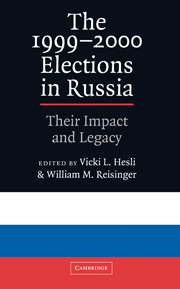Book contents
- Frontmatter
- Contents
- Contributors
- Acknowledgment
- SECTION I INTRODUCTION
- SECTION II PARTIES IN THE ELECTORATE
- 2 Television, Voters, and the Development of the “Broadcast Party”
- 3 Parties, Voters, and Foreign Policy
- 4 The Foreign Policy Implications of the Elections
- 5 Parties, Leaders, and Voters in the Parliamentary Election
- SECTION III THE ROLE OF REGIONAL POWER
- SECTION IV PARTIES AND INSTITUTIONS
- SECTION V CONCLUSION
- Bibliography
- Index
5 - Parties, Leaders, and Voters in the Parliamentary Election
Published online by Cambridge University Press: 23 October 2009
- Frontmatter
- Contents
- Contributors
- Acknowledgment
- SECTION I INTRODUCTION
- SECTION II PARTIES IN THE ELECTORATE
- 2 Television, Voters, and the Development of the “Broadcast Party”
- 3 Parties, Voters, and Foreign Policy
- 4 The Foreign Policy Implications of the Elections
- 5 Parties, Leaders, and Voters in the Parliamentary Election
- SECTION III THE ROLE OF REGIONAL POWER
- SECTION IV PARTIES AND INSTITUTIONS
- SECTION V CONCLUSION
- Bibliography
- Index
Summary
Students of regime change trenchantly argue that the more election campaigning and voting behavior are pegged to political parties, and the less to candidates, the brighter the prospects for nurturing democracy (e.g., see Aldrich 1995; Mainwaring 1999). This claim rests on two pillars. The first is the observation that, as collective actors with professional staffs, parties are better suited than solo leaders to presenting citizens with principled choices. A party-based mass politics will tend to be richer in issue content than a leader-based politics revolving around personal virtues and vices, populist rhetoric, and clientelistic networks. It should enable citizens to make more judicious and more value-impelled voting decisions and to be more forceful in demanding governmental accountability to them after election day. The second rationale for the superiority of parties has to do with their perseverance over time. Parties and the loyalties they engender are capable of persisting for many more years than the political career or the life span of a single president, prime minister, or party chairman. Specialists on the micro-foundations of voting come away, in the words of a classic text, “impressed by the degree to which the emotional attachments formed by voters toward specific political parties … become remarkably durable … as well as pervasive in their effects, lending a predictable coloration to all manner of political evaluations” (Converse and Pierce 1986, 68).
- Type
- Chapter
- Information
- The 1999–2000 Elections in RussiaTheir Impact and Legacy, pp. 90 - 118Publisher: Cambridge University PressPrint publication year: 2003
- 3
- Cited by



